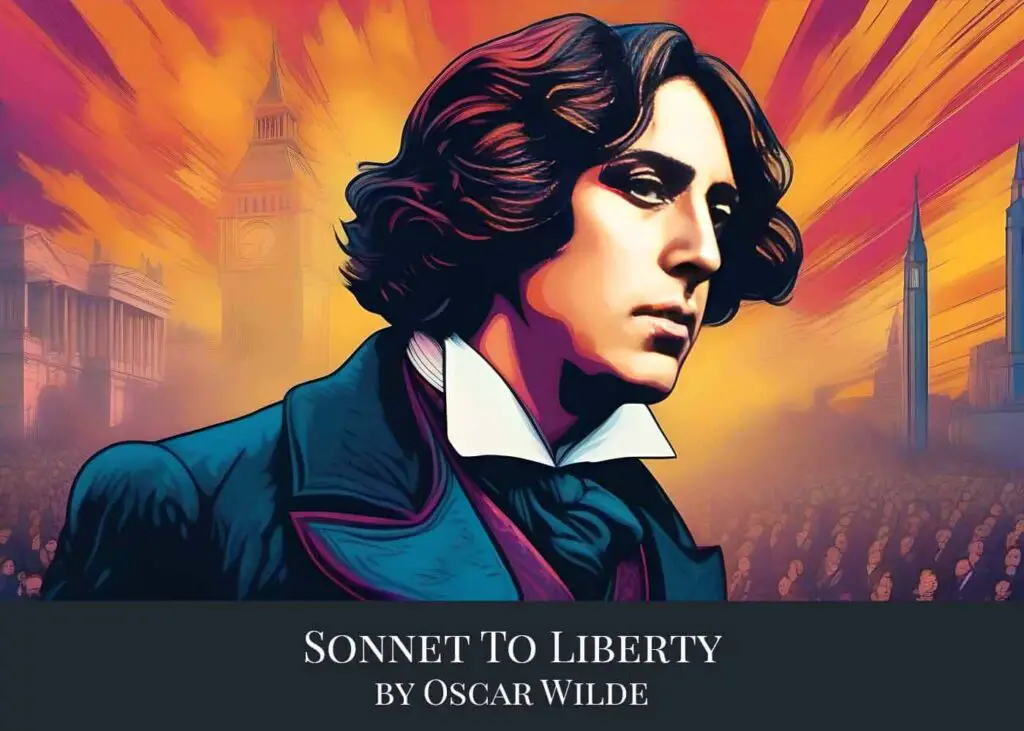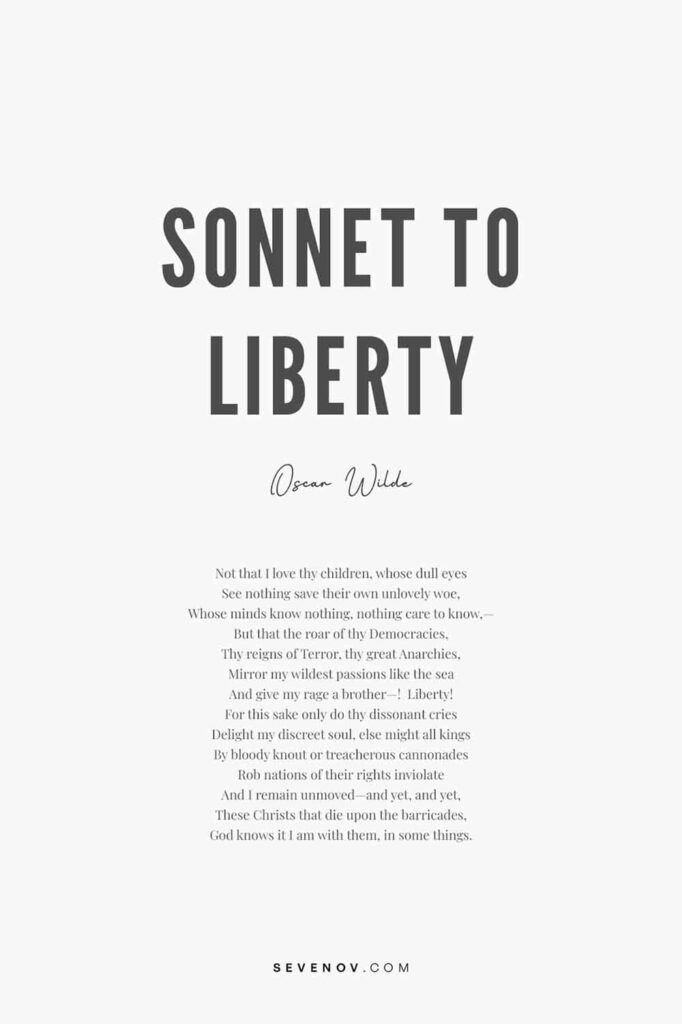
Sonnet To Liberty by Oscar Wilde
“Sonnet to Liberty” by Irish poet and playwright Oscar Wilde is a reflective piece that delves into the complexities of liberty and revolution. Written in the traditional sonnet form, Wilde uses the poem to explore his ambivalent feelings toward political uprisings and the concept of freedom. While he may not resonate with every aspect of revolution, he finds himself deeply moved by certain elements of it. The poem is a testament to Wilde’s profound ability to blend personal sentiment with broader societal themes, showcasing his nuanced perspective on the turbulent politics of his time.
Collected in Poems, , Wilde’s first collection of poetry, this sonnet stands as a representative of Wilde’s contemplative and often contradictory views on society and human nature. Discover Poems online at PageVio for a deep dive into his literary brilliance.
1. The Poem
Not that I love thy children, whose dull eyes
See nothing save their own unlovely woe,
Whose minds know nothing, nothing care to know,—
But that the roar of thy Democracies,
Thy reigns of Terror, thy great Anarchies,
Mirror my wildest passions like the sea
And give my rage a brother—! Liberty!
For this sake only do thy dissonant cries
Delight my discreet soul, else might all kings
By bloody knout or treacherous cannonades
Rob nations of their rights inviolate
And I remain unmoved—and yet, and yet,
These Christs that die upon the barricades,
God knows it I am with them, in some things.

Download Sonnet To Liberty by Oscar Wilde Poster
Size: 8″ x 12″ (2:3 ratio)
Format: PDF
Note: Actual poster background color is white. For the sample poster, the background is made gray for illustration purpose.
2. Sonnet To Liberty Analysis
This poem reflects on the relationship between the speaker’s personal passions and the political upheavals of democracies, with an evident focus on revolution and rebellion.
First Four Lines:
The speaker starts by expressing disinterest or even disdain towards “thy children”, likely referring to the common masses of the democracy or a revolution. He sees them as being consumed by their own miseries, with “dull eyes” that can’t see beyond their immediate suffering. They are also depicted as ignorant, showing neither knowledge nor interest in anything beyond themselves.
Next Four Lines:
Despite his detachment from the common masses, the speaker is deeply affected by the broader political and social upheavals, the “roar of thy Democracies”. He mentions reigns of terror and great anarchies, which could be references to revolutionary periods like the French Revolution or other historical movements that brought about great societal change. The chaos and passion of these movements resonate with the speaker’s “wildest passions”. They echo his internal rage, suggesting that he identifies with the revolutionary fervor on an emotional, if not ideological, level. The cry of “Liberty!” is the embodiment of the aim of these revolutions.
Next Four Lines:
The speaker states that he is delighted by the sounds of these revolutions primarily because they mirror his own passions. If not for this resonance, he might be indifferent to the oppressive actions of kings, whether they used violent force (“bloody knout”) or deceitful means (“treacherous cannonades”) to suppress the rights of nations. The tone here suggests that it’s the emotional pull of the revolutions, rather than a deep-seated ideological belief, that draws him in.
Last Two Lines:
The poem culminates with a reflection on the martyrs of these revolutions, the “Christs that die upon the barricades”. The comparison to Christ paints these martyrs as sacrificial figures who give their lives for a larger cause. The speaker concedes that even though he might not align with them in all respects, he is with them “in some things”. This underscores the poem’s theme of personal passion aligning with, or being reflected in, broader societal changes.
In essence, the poem navigates the complex relationship between personal emotions and societal upheavals, suggesting that sometimes, it’s not the intellectual or ideological alignment that draws one to a cause, but the emotional resonance it carries.
3. Conclusion
If “Sonnet to Liberty” and its exploration of the intricate ties between personal emotions and societal turmoil captivated you, consider delving into our collection of Oscar Wilde’s poetry for further profound works.




